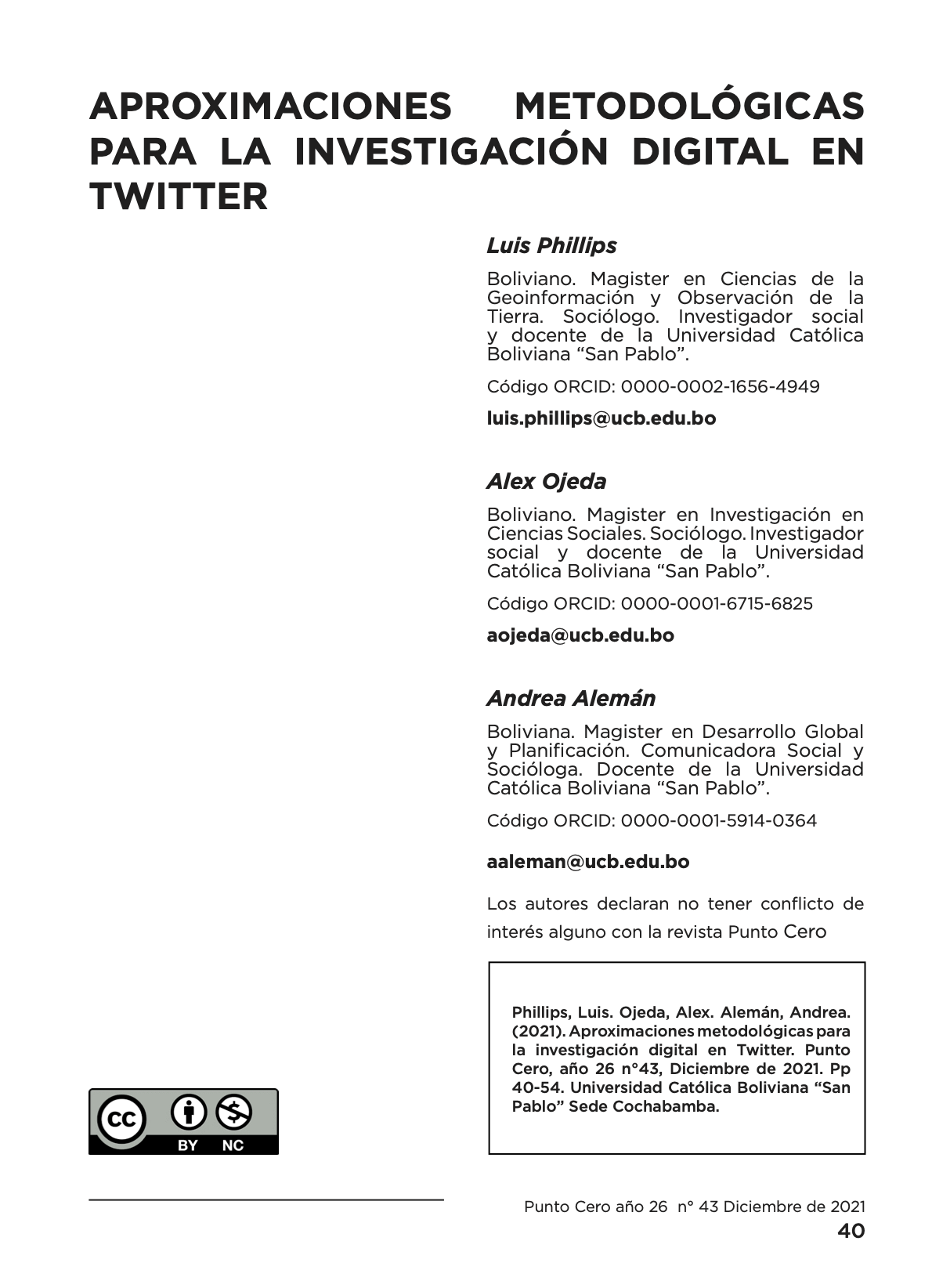Methodological approaches for digital research on Twitter
DOI:
https://doi.org/10.35319/puntocero.202143179Keywords:
Social Research, Digital Social Networks, Social Media, TwitterAbstract
As part of the research “Senses of democracy generated in the digital communities formed in Twitter, as of the crisis of October 20, 2019 in Bolivia”, the article aims to introduce essential methodological elements for consulting data from the API from Twitter through the RStudio IDE and the “academictwitteR” and “tidyverse” libraries applied in the study. A tour is made of the data model that Twitter uses to optimize queries in its API v2 and the Academic Research Product Track, which allows academic research to access the historical base of tweets and make queries. In addition, three aspects of analysis and visualization of the data obtained are presented: descriptive statistical analysis, content analysis and network analysis. The coexistence of society between the Internet and the face-to-face sphere highlights the need to apply digital social methods for data analysis, which is why this article becomes a space for understanding a method applied to this type of research.
References
Alexa. (2021). Alexa. Top Sites in Bolivia. https://www.alexa.com/topsites/countries/BO
Barrie, C. y Ho, J. (2021). academictwitteR: An R package to access the Twitter Academic Research Product Track v2 API endpoint. Journal of Open Source Software, 6(62), 3272. https://doi.org/10.21105/joss.03272 DOI: https://doi.org/10.21105/joss.03272
Clark, M. (2014). R y Social Science. Journal of Statistical Software.
Congosto, M. L.; Fernández, M. y Moro, E. (2011). Twitter y política: Información, opinión y ¿predicción? En Cuadernos de comunicación. 4. Comunicación política 2.0 (pp. 11-16). Evoca. Comunicación e imagen.
IBM. (2021, abril 9). What is an Application Programming Interface (API). https://www.ibm.com/cloud/learn/api
Manfredi-Sánchez, J.L.; Amado-Suárez, A. y Waisbord, S. (2021). Presidential Twitter in the face of COVID-19: Between populism and pop politics. Comunicar, 29(66), 83-94. https://doi.org/10.3916/C66-2021-07 DOI: https://doi.org/10.3916/C66-2021-07
Ojeda, A. (2015). Introducción al Análisis de Redes Sociales. Mente Maestra.umss.edu.bo
Phillips, L. A. y Alemán, A. (2019). #GolpeDeEstado y #FraudeEnBolivia: Un análisis de las comunidades digitales en la crisis del 20/O. Punto Cero, 24(39), 51-61. DOI: https://doi.org/10.35319/puntocero.20193923
Sayce, D. (2019). The Number of tweets per day in 2020. dsayce. https://www.dsayce.com/social-media/tweets-day/
Scolari, C. (2013). Hipermediaciones elementos para una teoría de la comunicación digital interactiva. Editorial Gedisa. Barcelona
Spiegel, M. y Stephens, L. (2009). Estadística (4ta edición) McGraw Hill. México
Tornes, A. y Trujillo, L. (2021). Enabling the future of academic research with the Twitter API. https://blog.twitter.com/developer/en_us/topics/tools/2021/enabling-the-future-of-academic-research-with-the-twitter-api
Twitter (2020a). Tweet object. https://developer.twitter.com/en/docs/twitter-api/data-dictionary/object-model/tweet
Twitter (2020b). Twitter API Documentation | Docs | Twitter Developer Platform. https://developer.twitter.com/en/docs/twitter-api
Twitter (2020c). Twitter API for Academic Research | Products. https://developer.twitter.com/en/products/twitter-api/academic-research
Twitter (2021). Success stories | Twitter Developer Platform. https://developer.twitter.com/en/community/success-stories
Villa-Cox, R.; Zeng, H.; KhudaBukhsh, A. y Carley, K. (2021). Exploring Polarization of Users Behavior on Twitter During the 2019 South American Protests. ArXiv, 1. http://arxiv.org/abs/2104.05611
Waisbord, S. y Amado, A. (2017). Populist communication by digital means: Presidential Twitter in Latin America. Information, Communication & Society, 20(9), 1330-1346. https://doi.org/10.1080/1369118X.2017.1328521 DOI: https://doi.org/10.1080/1369118X.2017.1328521

Downloads
Published
How to Cite
Issue
Section
License
Copyright (c) 2021 Revista Punto Cero

This work is licensed under a Creative Commons Attribution-NonCommercial 4.0 International License.








